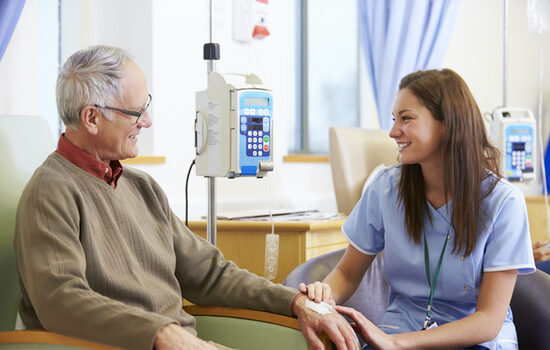Important Traffic Notice: Due to road construction on Southwest Highway directly in front of our Chicago Ridge location, traffic may be heavier than usual. Please plan ahead and allow extra time to arrive safely. Thank you for your patience and understanding!
July 30, 2021
What You Need to Know if You Are Considering a Clinical Trial for Cancer Treatment

Clinical trials are long-term scientific studies that test and compare the results of new cancer treatments to the existing options for that type of cancer. Or, in some cases, it’s an entirely new treatment for a particular kind of cancer. The goal of the clinical trial process is to receive FDA approval for the treatment so all patients with the same type of cancer have it as a treatment option.
Before a new therapy is available to cancer patients, it’s first tested extensively in a lab. Next it moves on to human trials which includes several phases, progressing from a very small group to a much larger group of patients before the FDA approves it.
Clinical trials are available for just about every type and stage of cancer. Each trial has a protocol that clearly describes what is being tested and who is eligible to participate. This can include the type and stage of cancer, previous treatments, location of distant cancer cells, and other requirements that ensure that the same types of patients are being tested.
Important Information About Joining a Clinical Trial for Cancer
For some patients who have tried several treatment options, the trial offers a life-saving treatment option that isn’t available otherwise. Other patients consider participation in a clinical trial as a way to give back to society and help future cancer patients. If a clinical trial is discussed with you, participation is not mandatory.
As mentioned, clinical trials aren’t always available for every patient; they are only available for those who qualify. The cancer research team at Affiliated Oncologists can help you determine if there is a clinical trial you are a good candidate for.
To help make a well-informed decision, here is what you should know before participating in a clinical trial for cancer research.
Risks Versus Benefits of Participating In a Cancer Research Trial
Most clinical trials have these potential benefits:
This is the most recent advancement in treatment for your type of cancer, available only to those who participate in the trial
Help others by advancing cancer research
It may pay for part or all of your medical care during the trial
More personal attention from your cancer care team
Taking an active role in your health care may enhance your sense of control over cancer

Remember, any medical test, treatment, or procedure has risks. Cancer patients are often willing to accept risk in the hope of successful treatment and possible remission.
Potential risks of a clinical trial include:
New treatment may have side effects that are more severe than the standard treatment
More doctor visits require more time and travel
The treatment may not help you. This could be true of standard treatments as well.
There may be costs related to participating in a clinical trial your insurance doesn’t cover. Insurance companies generally cover the cost of standard treatment.
After weighing the pros and cons of participation and talking with your oncologist, decide if the benefits outweigh the risks.
Protection of Patient Safety During a Cancer Clinical Trial
Patient safety is the top priority when running clinical trials. Several safeguards are implemented to protect them. While all clinical studies involve some level of risk, these measures aim to minimize those risks as much as possible. Federal regulations protect your rights and safety in three ways.
First, informed consent is required. This means all participants receive detailed information about the study, their questions are answered, and they’re given adequate time to decide without pressure from anyone.
Second, an Institutional Review Board (IRB) must approve the clinical trial protocol before the trial begins. This review is conducted by scientific experts who are not connected to the trial.
A Data Safety Monitoring Board (DSMB) is required for Phase I through Phase III clinical trials. The board ensures that the trial is conducted safely and determines when to conclude the trial based on significant benefits or risks that are evident. The extent of monitoring is correlated with how large the study is and how complex the study may be.
Financial Costs Associated With Clinical Trials
One of the first and most logical questions is, “How much does it cost to participate in a clinical trial?” In many cases, the trial sponsor covers most of the costs associated with participating in the clinical trial. This includes the drugs used to treat the patient, additional clinic visits that may be needed, and any tests required by the study to monitor the results.
While some expenses are covered by the trial, you may still need to pay for certain doctor’s appointments, imaging, or procedures such as surgery. Your health insurance might cover some of these expenses.
You can work with the financial counselors or contact your insurance company on your own to discuss what is covered through insurance and what you will be responsible for paying.
Is Clinical Trial Participation Right for Me?
The decision to participate in a cancer research trial is very personal. You may need some time to consider it. Talking it through with your loved ones can help.
Feel free to ask yourself, your family, or your cancer care team, questions such as this:
Why do I want to participate in this clinical trial?
Am I comfortable with a level of risk that this treatment won’t work?
What does this trial offer that the standard of care does not?
Do I have any concerns about participating? List them and reach out to your cancer care team for answers.
Do the benefits of participating outweigh the risks?
Do I clearly understand other treatment options if I don’t participate?
Find answers to some of the most commonly asked questions about clinical trial participation.
Cancer Research Trials are Available in the South Chicago Suburbs
Affiliated Oncologists is an established research leader in communities across the greater Chicago area. We offer clinical trials through the Sarah Cannon Research Institute (SCRI), one of the world’s leading oncology research organizations conducting community-based clinical trials. Discover cancer clinical trials available at Affiliated Oncologists in Chicago Ridge and Orland Park, Illinois.
If you’re interested in learning more about trials that may be available to you, request an appointment at Affiliated Oncologists.
If you are a patient at Affiliated Oncologists and want to participate in a clinical trial, you don't have to change your cancer care team. In some cases, your oncologist may recommend a clinical trial as the best option for cancer treatment. All of your care remains local and convenient for you.
Originally published July 2021. Updated March 2025.
Categories: General Cancer, Clinical Trials & Research